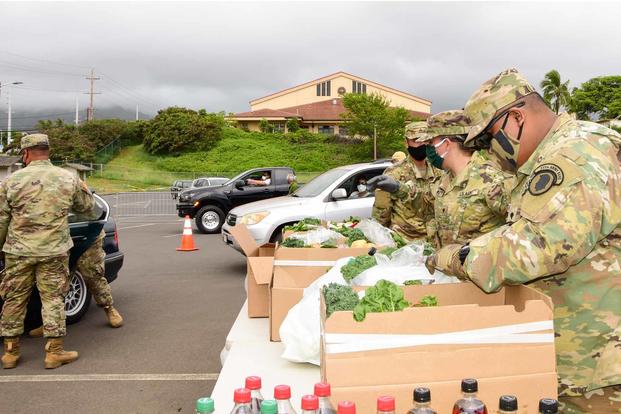U.S. service members stationed in Hawaii may see a major hit to their cost-of-living allowances this year even though gas, groceries and housing costs continue to rise on the Pacific island chain.
Marine Corps Forces Pacific Headquarters warned in a Facebook post Thursday that cuts to the allowances could translate to a "$280-$500 per month" decrease starting in November.
"Senior leadership is aware and engaged with regards to the planned COLA reduction," Marine Corps Forces Pacific Headquarters wrote on Facebook. "We understand our families are living with high inflation which translates to higher costs for all living in Hawaii."
The Department of Defense circulated information about a looming COLA reduction to the various services in a memo Sept. 6. After being contacted by Military.com on Friday about the allowance cut, Cmdr. Nicole Schwegman, a Pentagon spokeswoman, said that the memo is being rescinded and that no final decision has been made.
"No decision has been made to implement a change to COLA for Hawaii," Schwegman said. "The Department and leaders at INDOPACOM are still reviewing the information collected in the recent Living Pattern Survey and Retail Price Schedule.
More than 40,000 active-duty service members and their families across the Army, Air Force, Navy and Marine Corps call Hawaii home, according to Hawaii.Gov.
Joint Base Pearl Harbor-Hickam, Camp H.M. Smith, Fort Shafter, Schofield Barracks, Wheeler Army Airfield, Naval Computer and Telecommunications Area Master Station Pacific, and Marine Corps Base Hawaii Kaneohe Bay are all located in the state.
The non-taxable overseas COLA allowance exists to make living in more expensive areas more affordable for service members stationed overseas by offsetting the cost of daily expenses to make them comparable to costs for bases in the contiguous U.S. With rising prices in the contiguous United States due to the pandemic and inflation, the gap has diminished, leading to the cuts. There is also a COLA allowance for the highest-cost locations in the continental U.S. (CONUS).
Information posted Thursday by Marine Corps Forces Pacific Headquarters on Facebook detailed a 10-point reduction in the cost-of-living allowance for the Hawaiian islands of Kauai and Oahu. An eight-point reduction was shown for Maui.
Amid rising grocery costs, even on-base shopping at U.S. military commissaries -- which are designed to offer affordable food prices compared to stores just outside installation walls -- has not helped military families save as much during the pandemic. Commissary prices are pegged to the civilian market, meaning that prices have also rapidly risen on base.
The potential cuts to the cost-of-living allowances have led to outrage among members of the Hawaii military community.
Many responded in the Facebook comments to Marine Corps Forces Pacific Headquarters' post that the news was a major blow to morale.
"Paycuts, manning shortage ... man y'all make it difficult to even want to stay in these days let alone join," the commenter wrote.
Hawaii is not the only overseas area to be hit with cost-of-living allowance decreases.
In May, the Pentagon announced that there would be a reduction in the overseas cost-of-living allowance for families in the Kaiserslautern Military Community starting June 1 because prices in the continental United States are now more expensive than those in Germany.
-- Thomas Novelly can be reached at thomas.novelly@military.com. Follow him on Twitter @TomNovelly.














